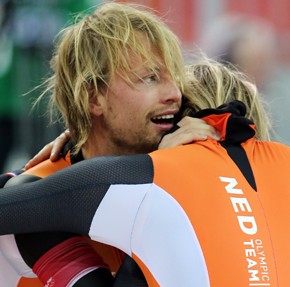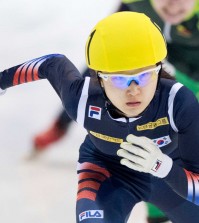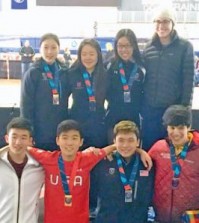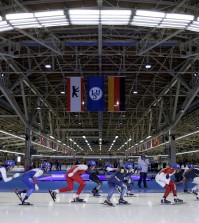- California Assembly OKs highest minimum wage in nation
- S. Korea unveils first graphic cigarette warnings
- US joins with South Korea, Japan in bid to deter North Korea
- LPGA golfer Chun In-gee finally back in action
- S. Korea won’t be top seed in final World Cup qualification round
- US men’s soccer misses 2nd straight Olympics
- US back on track in qualifying with 4-0 win over Guatemala
- High-intensity workout injuries spawn cottage industry
- CDC expands range of Zika mosquitoes into parts of Northeast
- Who knew? ‘The Walking Dead’ is helping families connect
Orange Crush
Korean men’s speed skating team has run into a Dutch wall

Netherlands’ gold medalist Michel Mulder, left, and his brother, bronze medalist Ronald Mulder embrace each other after the speed skating: men’s 500m event during the Sochi Winter Olympics on February 10, 2014. Compatriot Jan Smeekens took silver. (UPI-Yonhap)
By Kim Tong-hyung
The Korean men’s speed-skating team entered the Olympics with high hopes. But in face of the Netherlands’ domination of speed-skating events that is quickly becoming historic, Korean skaters are now dreading the possibility of leaving the Olympics without a medal.
Mo Tae-bum, who had attempted to defend his 500-meter gold at the Vancouver Olympics, failed to hide his disappointment after finishing fourth behind a trio of Dutch skaters including new champion Michel Mulder at Adler Arena Skating Center on Monday.
The Dutch men had also taken a clean sweep of the medals in the 5,000-meters on Saturday with Sven Kramer taking the gold ahead of Jan Blokhuijsen and Jorrit Bergsma. Korea’s defending champion Lee Seung-hoon, who skated after the eventual medalists, looked overwhelmed by their impressive times and struggled to finish at 12th.
Expectations had been lower for Lee Kyou-hyuk, the 36-year-old veteran in his sixth and probably final Olympic, who finished 18th in the 500-meter final.
Mo and Lee are hoping for better results in the 1,000-meter final, an event where Mo won the silver in Vancouver. However, the 1,000-meter has never been Mo’s best event and his shot at the podium will be disrupted by American Shani Davis, who is chasing his third-straight 1,000-meter gold, and the juggernaut Dutch skaters.
The Netherlands has always been a powerhouse in speed skating, but Sochi is shaping up to be their best Olympic yet. In the women’s competition, Irene Wust won the gold in the 3,000-meter event, matching the brilliance of her male compatriots.
Oh Yong-seok, coach of Dankuk University’s skating team who is in Sochi as a games official, said he was impressed with the level of innovation Dutch skaters are achieving with their skills. While most of the great Dutch skaters had been produced from long-distance events, skaters like Mulder are extending the country’s strength to shorter distances, previously ruled by skaters from North America and Asia.
”It’s clear that the Dutch skaters are much more advanced in their skills than before,’’ Oh told Korean reporters.
”The way they control their skates and feet are much more sophisticated. In previous years, Dutch skaters in short distance seemed to skate like their long-distance compatriots, relying on their strength, stamina and their length, but now they seem to have acquired the skills to maximize their physical abilities.’’
In the 500-meter final, Mulder, 27, finished only 0.01 seconds ahead of Jan Smeekens with a combined time of 69.32 seconds over two runs. An impressive second run from Ronald Mulder earned him the bronze, making them only the second set of twins to win medals in the same Olympic event.
Mo didn’t skate badly as his combined time of 69.69 seconds was better than the 69.76 seconds he clocked at last year’s world championships held at the same venue.
Still, that was 0.23 seconds slower than Ronald Mulder. It remains to be seen whether that would be as close Mo would come in winning a medal in this Olympics.











![일본 사도광산 [서경덕 교수 제공. 재판매 및 DB 금지]](http://www.koreatimesus.com/wp-content/uploads/2024/07/PYH2024072610800050400_P4-copy-120x134.jpg)


